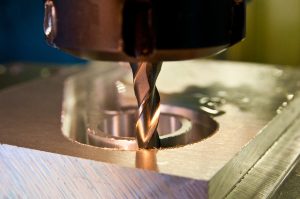How CNC Machining Is Impacting Modern-Day Manufacturing
May 03, 2022 CNC machining has been employed across multiple industries for modern manufacturing. Its impact is huge—CNC machining has optimized the cost, precision, and safety of manufacturing, and it has a wide range of applications for parts production. We have outlined how CNC machining has impacted modern-day manufacturing compared to conventional machining here.
CNC machining has been employed across multiple industries for modern manufacturing. Its impact is huge—CNC machining has optimized the cost, precision, and safety of manufacturing, and it has a wide range of applications for parts production. We have outlined how CNC machining has impacted modern-day manufacturing compared to conventional machining here.
How CNC Machining Works
CNC machining is a method for manufacturing parts that depends on a computer to implement a variety of machine functions. An engineer uses a computer program to guide the machine to cut, grind, mill, or lathe a piece of material into the desired shape for the project, and they can implement features to handle the most complex of processes, including:
- Multi-axis machining
- Plasma cutters
- Water jet cutters
Computer-aided machining software implements codes to regulate the machining process to be incredibly accurate. It’s so precise that little to no manual intervention is required to produce the part.
Benefits of CNC Machining
Implementing CNC machines, computer-aided design (CAD), and computer-aided manufacturing (CAM) for parts production allows manufacturers to supply precision components to the aerospace, medical, and automotive industries.
The most significant benefit of CNC machining is that it rapidly and accurately manufactures parts automatically, reducing the chance of human error. Additionally, it increases production volume while lowering costs. CNC machining also allows for more competition between small and large companies due to the reduced overhead. Let’s dive deeper into these benefits.
Flawless Component Creation
No matter how experienced an engineer is, a conventional machine will produce parts that are somewhat different from the prototype, even if the difference is marginal. This can negatively impact how the pieces fit and function in their intended housing. However, CNC machines produce flawless components that match the specifications precisely—every time. This meets the demand for perfect parts that can be produced at extremely high volumes and work in their intended final products without a doubt.
Reduction in Labor Costs
CNC machining helps lessen operating costs and boost company revenue. Also, CNC machines only require light cleaning and replacement of certain parts and tools at specific intervals, usually yearly or monthly, depending on usage. It’s simple to maintain these machines and ensure they don’t break down, and all of the maintenance can be done quickly by in-house employees.
Increased Output and Quality
CNC machining increases production efficiency and can scale to almost any level of required production volume while maintaining exceptional accuracy, even for the most complex shapes. To minimize the risk of machines breaking and ensure top-quality component production, manufacturers have begun using predictive technology to ensure the machines are functioning correctly and fixing problems before they arise. This reduces the risk of downtime, further increasing output.
Overall, CNC machines allow for high-precision parts to be produced far faster than conventional methods, all while keeping overhead low and reducing labor costs. These are all invaluable benefits for the demands of modern manufacturing.
Empowering Manufacturers With Advanced Technology
Demmer Manufacturing is proud to have affiliates working with the most cutting-edge CNC machines to push modern-day manufacturing to the limit. This means they’re operating with the utmost efficiency and reliably producing high-quality components on a daily basis—all while maintaining competitive pricing.
Demmer Manufacturing supports our portfolio companies’ growth by investing in their technology, infrastructure, and people. You can learn more by clicking here.

